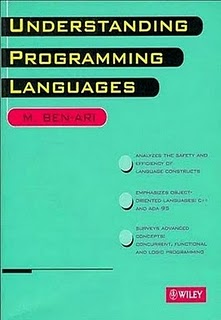
|
FreeComputerBooks.com
Links to Free Computer, Mathematics, Technical Books all over the World
|
|
- Title: Understanding Programming Languages
- Author(s) Monti Ben-Ari
- Publisher: John Wiley & Sons; 1 edition (March 12, 1996)
- Paperback: 376 pages
- eBook: Online, zipped PDF file, 0.8 MB
- Language: English
- ISBN-10: 0471958468
- ISBN-13: 978-0471958468
- Share This:

|
To say that a good programmer can write good software in any language is like saying that a good pilot can fly any aircraft: true, but irrelevant. The choice of a programming language is one of the most important factors that influence the ultimate quality of a software system.
Unfortunately, too many programmers have poor linguistic skills: they are passionately in love with their "native" language, but are not able to analyze language constructs. Understanding Programming Languages explains:
- what alternatives are available to the language designer
- how language constructs should be used for safety and readability
- how language constructs are implemented
- the role of language in expressing and enforcing abstractions.
This book compares constructs from C with constructs from Ada in terms of levels of abstractions. Studying these languages provides a firm foundation for an extensive examination of object-oriented language support in C++ and Ada 95.
It explains what alternatives are available to the language designer, how language constructs should be used in terms of safety and readability, how language constructs are implemented and which ones can be efficiently compiled and the role of language in expressing and enforcing abstractions.
The final chapters introduce functional (ML) and logic (Prolog) programming languages to demonstrate that imperative languages are not conceptual necessities for programming.
About the Authors- Robert Harper is a professor of Computer Science at Carnegie Mellon University.
- Theory of Programming Languages
- Compiler Construction
- Computer and Programming Languages
- Computer Science
 Similar Books:
Similar Books:
-
 Practical Foundations for Programming Languages (Robert Harper)
Practical Foundations for Programming Languages (Robert Harper)
An excellent introduction to a wide range of programming language concepts. They are all uniformly and carefully explained, using techniques that are very useful in practice for both analysis and implementation of programming languages.
-
 Programming Languages: Application and Interpretation
Programming Languages: Application and Interpretation
This book unites two approaches to teaching programming languages, one based on a survey of languages and the other on writing definitional interpreters. The main programming language used in this book is Racket.
-
 Programming Languages at a Glance (Andreas Hohmann)
Programming Languages at a Glance (Andreas Hohmann)
This book tries to explain a number of programming languages, covering a wide range from currently popular ones such as Java, Perl, Python, and C# to less known languages such as ML, Haskell.
-
 Anatomy of Programming Languages (William R. Cook)
Anatomy of Programming Languages (William R. Cook)
This book is a series of notes about programming languages, originally written for students of the undergraduate programming languages course. It uses Haskell, a pure functional language.
-
 Advanced Programming Language Design (Raphael Finkel)
Advanced Programming Language Design (Raphael Finkel)
The goal of this book, is to expose first-year graduate students to a wide range of programming language paradigms and issues, so that they can understand the literature on programming languages and even conduct research in this field.
-
 Implementing Programming Languages: Compilers and Interpreters
Implementing Programming Languages: Compilers and Interpreters
This book follows a theory-based practical approach, where theoretical models serve as blueprint for actual coding. The reader is guided to build compilers and interpreters in a well-understood and scalable way.
-
 Programming and Programming Languages (Shriram Krishnamurthi)
Programming and Programming Languages (Shriram Krishnamurthi)
It's basically two books in one, integrated. One book is an introduction to programming, teaching you basic concepts of organizing data and the programs that operate over them. The other book is an introduction to programming languages.
-
 Introduction to Compilers and Language Design (Douglas Thain)
Introduction to Compilers and Language Design (Douglas Thain)
This book offers a one semester introduction into compiler construction, enabling the reader to build a simple compiler that accepts a C-like language and translates it into working X86 or ARM assembly language.





